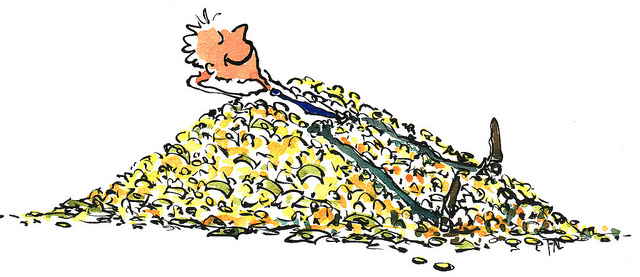
Money Pile by Hikingartist.com
28% of Americans do not have any emergency savings. While 66% did not have enough money saved to cover six months of expenses. Are you one of the 66% or are you in the 39% who has made a habit of saving?
Most people will say that they don’t make enough money to be able to save anything. But is this the truth?
Unlikely. The truth of the matter is that expenses tend to grow faster than income. As income grows, less and less thought is placed on how and why money is being spent. This problem can get truly ridiculous, as in the case of the Wall St. executives complaining that their $350, 000 salaries just don’t cut it. This means that even among the top 1% there are probably some idiots without emergency savings.
LISTEN UP DEAR READER: To control your money is to control your life. To control your life is to control your money.
It saddens me to see the number of young people so deeply in debt and without even the most basic understanding of the tools needed to better their financial position. Even sadder are the people my age or older who have not saved for retirement, are underwater on their mortgages and placed too much confidence in the honesty of their bankers.
In many ways, the Great Recession has caused many of us to look to our own resources and re-learn basic concepts. The most basic tool of personal finance of the mature man (or anyone else) is a budget. In the good ole’ days prior to the collapse of 2007 budgets were considered quaint, a sign that you were a cheap penny pincher who didn’t know how to live. If you still have that notion do us both a favour and please stop reading. A budget catalogs the movement of money, how much comes in, how much goes out, and where it goes.
If you have any misguided thoughts as to the importance of controlling your funds, I can refer you to the classics:
The Richest Man in Babylon (free ebook)
The Art of Worldy Wisdom (free ebook)
The Prince (download link to project Gutenberg)
Dave Ramsey’s Complete Guide to Money
The first time I did a budget, I came to tears (Monthly income after mortgage, union dues, etc were subtracted: $774) I always seemed to be coming up short on funds or forgetting about really important expenses such as truck and house insurance. My money problems affected the way I treated my family and myself. If you’ve never done a budget and your finances are ruining your relationships. I implore you to try budgeting.
I use a modified Zero Based budget. Here is how you can do the same:
You will need:
A superfast computer running the latest personal finance software plus Charles Schwab and the accountants from Enron.
Or.
Use what I’ve used for the last 12 years. Pen, Paper, calculator, Zip-loc bag.
1. For one month spend as you usually do but collect every receipt for every item that your purchase. If you forget to get a receipt, write the amount you spent on goods/services and slip into the bag. All purchases go into the bag, lunch, lunch money for children, gas, trips to restaurants, doctor visits, everything.
2. At the end of the month total up your expenses. The first time I did this I was shocked to find that I was spending $60 per month at the fast-food joints in my area. Kentucky, Burger King and Wendy’s were making a financial and cardiovascular killing (Dammit! I don’t even like Wendy’s). You will be surprised. Categorize your receipts, food, utilities, clothes.
3. You now have a rough estimate of how much you are spending each month. If you are an average citizen your monthly expenses are around $1,000 more per month than you expected once you add in bills that are paid only once per year such as car insurance.
4. Take up a pen, write on paper the amount you make each month. Subtract the amount that you will give to charity or your tithes, then subtract between 10 to 15% percent for your personal savings and emergency fund. Subtract the various categories, such as gas, utilities, medicine, credit card bills, clothes, etc.
5. There will be expenses that you miss during your first budget, but this budgeting method is more likely to succeed because you learn your expenses first. Therefore, it will better reflect your reality. You decide what needs to be cut back on, and what needs more of your attention. Secondly, even when unpleasant financial surprises pop-up you’ll be ready because you have built savings, emergency funds, money for gifts, into a budget that you control.
6. Remember that budgeting is a skill, you’ll get better the more you practice. The practice will pay off the first time your significant other, a subordinate, a friend looks at you with respect and acknowledges your Mastery of Money.
You now have control of your money and control of your life.
